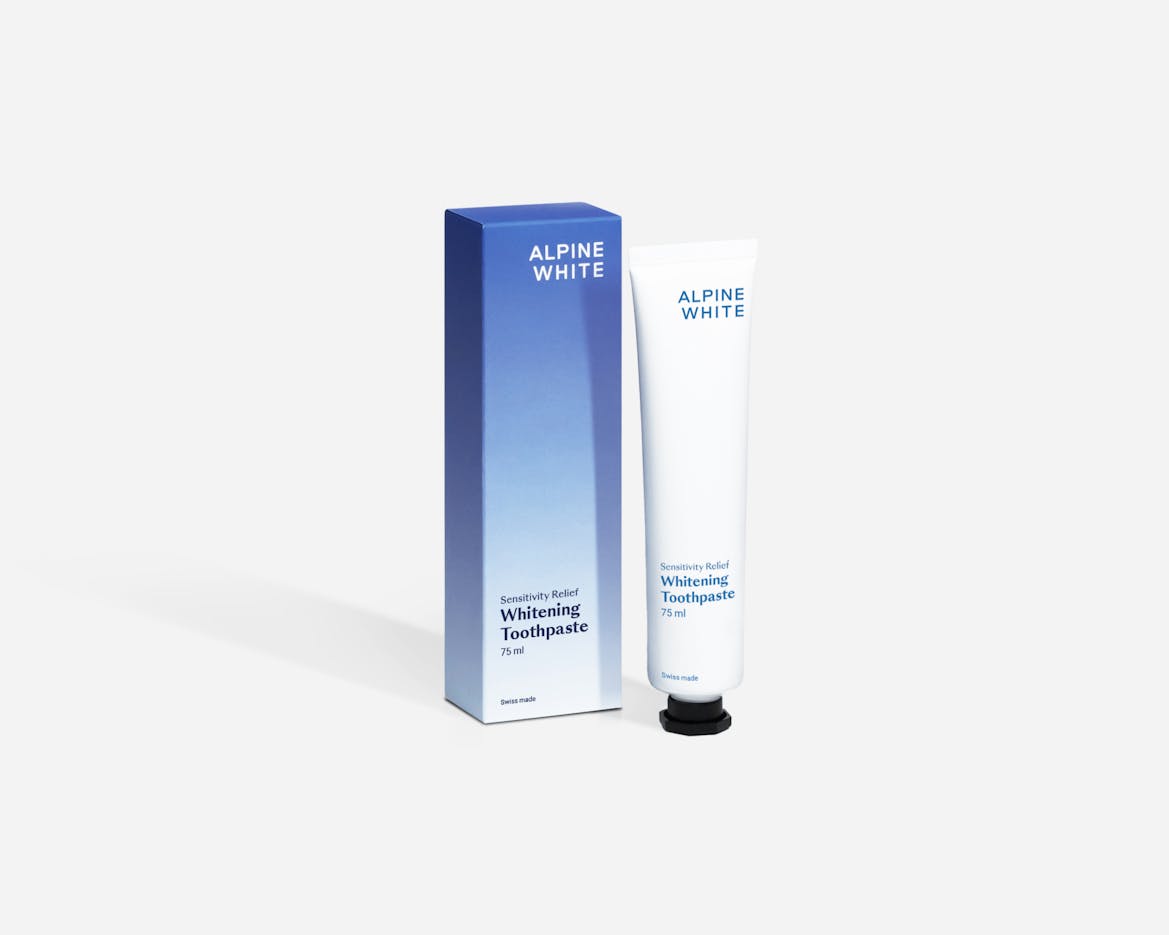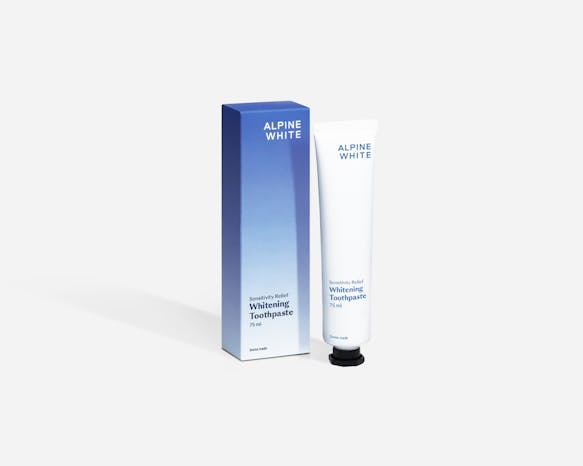Toothache from a cold
Do you know that aching, dull feeling in your teeth when you have a cold? There is actually a reason for this - and it has to do with how our body fights off infections. Here's why your teeth can hurt when you're sick and why you don't necessarily need to go to the dentist.



Causes of tooth pain during a cold
Common causes of toothache are tooth decay, periodontitis, or diseases of the dental nerves. However, there are also other reasons for this pain. For example, an inflammation of the sinuses. Because when you get a cold or flu, your body works hard to fight the infection which can cause sinusitis. If eating ice cream and drinking cold drinks make your teeth hurt, you are probably also suffering from tooth sensitivity. This can cause pain and discomfort in your sinuses and throughout your jaw as this inflammation spreads to the cavities in your mouth and jaw. The pain is then often felt like a toothache in the upper teeth because the roots of the teeth in the upper jaw are very long and the tips of the roots are in the sinus cavities. The pain is also felt on the whole jaw and not just on the individual tooth.
Sensitive teeth
Intense tooth discomfort is typically a symptom when you don't normally have sensitive teeth, but suddenly feel significant pain in a tooth when you go outside into a cold environment. Sensitive teeth can have many different causes, some of which have nothing to do with the teeth at all.
For instance, if your sinuses are inflamed, the pressure may cause your teeth to hurt both inside and outside. Pain that seems to be coming from your teeth could be caused by an ear infection or a problem with your jawbone. Another cause of sensitive teeth in some people is gum disease. The discomfort brought on by ear, gum, or jaw issues may be made worse by cold air.
If you suffer from tooth sensitivity, you can use our Whitening Toothpaste Sensitivity Relief, which consists of fluoride and further helps combat the sensitivity.


Your first aid for sensitive teeth. Whitening for sensitive teeth with Whitening Toothpaste Sensitivity Relief. For gentle daily dental and oral hygiene.
- Relieves tooth hypersensitivity
- Based on our clinically tested Whitening formulation
- Remineralizes the enamel and relieves existing tooth sensitivity
- Antioxidants for healthy gums
- Formulated and produced in Switzerland
Side effects from a nasal congestion
Your oral health could be significantly impacted by congested nasal passages. When our noses are blocked, we frequently breathe through our mouths. Because of a stuffy nose, especially while we sleep, our mouths may become dry, which will dramatically lessen the flow of saliva.
Saliva must flow freely in order to maintain our teeth and gums healthy. A bacterial infection can build along our gum line when our mouths are very dry, which can result in gingivitis. Periodontal disease is a more serious dental disorder that starts with gingivitis.
Dehydration is also a factor in toothache from a cold, as saliva helps to moisten the mouth, washing away food debris that may have been left behind after eating. However, when you're congested from a cold, saliva has a hard time reaching these areas in the mouth and more bacteria can build up, leading to more pain. Finally, the blowing and sneezing that comes with a cold can damage the surfaces of your teeth, causing further discomfort when you try to eat or drink something hot or cold. If you take good care of yourself during a cold, you can reduce some of these factors and maintain healthy teeth.
Dry mouth
Due to insufficient saliva flow to prevent oral bacteria from settling in, a dry mouth can facilitate the growth of oral bacteria, increasing the risk of tooth decay and gum disease. As a result, when you have a cold, staying hydrated is crucial. A dry mouth adds to a sore throat, which makes it challenging to chew and swallow. This may lead you to avoid foods and beverages, which your body requires for proper hydration.
Drink plenty of liquids to combat dry mouth, especially if you're using a nasal decongestant. Cough drops can also assist stimulate saliva production, and running a humidifier in your house will maintain a moist environment, preventing you from dehydrating.
Sinusitis and toothache
Sinusitis and toothache are closely linked because the inflammation spreads to the mouth and jaw area during a cold. During a cold, our body releases mucus that accumulates around the teeth and gums, causing pressure that then manifests as tooth pain. This happens because the excess mucus prevents saliva from reaching these areas, allowing bacteria to build up and cause further pain.
Chronic sinusitis
Not only can a cold lead to sinusitis and tooth pain, but chronic sinusitis caused by a dead or infected tooth can also lead to facial swelling and even blindness if left untreated. Treatment options include antibiotics, surgical drainage procedures and, in some cases, removal of the tooth. To prevent this, it is important to maintain good dental health. This means brushing your teeth at least twice a day, flossing and scheduling regular professional dental cleanings. In addition, eating healthy foods that are high in antioxidants can strengthen your body's natural defences and make it easier for it to fight infections. Therefore, it is important to take good dental care during a period of illness to reduce the risk of toothache caused by infection or tooth decay.
Maxillary sinusitis
Sinusitis maxillaris is a special form of sinusitis, which is the inflammation of the sinuses. Chronic maxillary sinusitis is a serious condition that can be caused by a decayed or infected tooth. When an infection occurs in the maxillary sinus, the tissues in the area become inflamed, causing pain, blockage and difficulty breathing. The cause of sinus infection from a dead tooth is multifactorial and can include bacterial overgrowth, bone erosion and airway obstruction due to gum disease or structural abnormalities. The bacteria that cause these infections are often Streptococcus pneumoniae, Haemophilus influenzae, Moraxella catarrhalis and Staphylococcus aureus. The inhibition of the natural defences of the body's immune system caused by these bacteria leads to chronic inflammation, which in turn contributes to the development of chronic maxillary sinusitis due to a dead tooth. Treatment of this condition includes antibiotics, surgical drainage procedures and, if necessary, removal of the tooth.
Combating with Ibuprofen and other painkillers
If you're struggling with a toothache, you don't have to torture yourself. Taking Ibuprofen or another painkiller can help relieve the discomfort and reduce the swelling of the mucous membranes. However, it's best to combine this with other solutions - such as gargling with warm salt water, nasal sprays or applying an ice pack - for extra relief. It is always a good idea to see a specialist to make sure that the pain is not caused by something else.
Home remedies for tooth pain
If you are looking for an easy way to relieve the symptoms of the common cold, a cold compress, inhaling with essential oils or saline solution, as well as a mouthwash with warm salt water, can be a good option. Cold compresses usually have an anti-inflammatory effect, which can relieve the pain associated with an ulcer. Taking oral care by rinsing the mouth with warm salt water is also a good choice because it helps to clean the affected area and reduce swelling. Moreover, due to the high sodium content of salt water, it even has an antiseptic effect!
If the pain persists
Mild or even sharp pain in the mouth should not be ignored as it could indicate a problem that should be discussed with a professional. If the sinus pain persists for more than a few days, it is important that you see a professional to check for a sinus or ear infection. You can book an Oral Health Checkup at our Studio and get advice. If an infection is present, it is important to develop an effective treatment plan to ensure that the symptoms are quickly relieved and the problem resolved. Don't delay coming to our Studio if you are in pain - the sooner you seek help, the better!


Not sure about the health of your mouth? Thanks to our innovative intra-oral camera, we can give you a detailed overview and offer you the best possible individual routine.
- We check your oral health and hygiene
- Checking your teeth for cavities
- Composition of an individual routine



